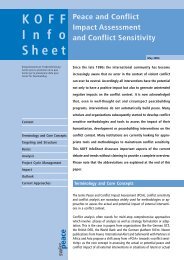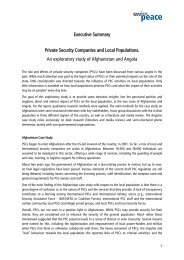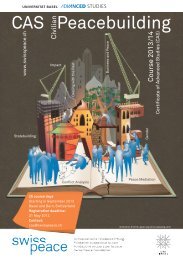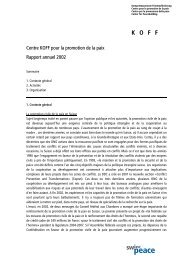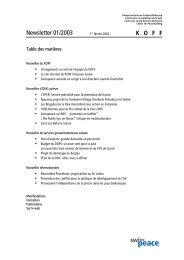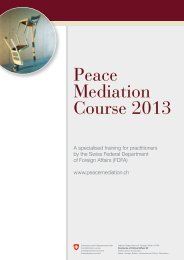Unpacking the Mystery of Mediation in African Peace ... - Swisspeace
Unpacking the Mystery of Mediation in African Peace ... - Swisspeace
Unpacking the Mystery of Mediation in African Peace ... - Swisspeace
You also want an ePaper? Increase the reach of your titles
YUMPU automatically turns print PDFs into web optimized ePapers that Google loves.
<strong>Mediation</strong> <strong>in</strong> <strong>African</strong> <strong>Peace</strong> Processes: Carefully Compar<strong>in</strong>g Apples and Oranges<br />
zations, NGOs) and experts from all over <strong>the</strong><br />
world. So despite <strong>the</strong> idea <strong>of</strong> <strong>African</strong> mediators<br />
for <strong>African</strong> conflicts be<strong>in</strong>g manifested by <strong>the</strong> chief<br />
mediator, most peace processes were shaped by<br />
<strong>in</strong>ternational politicians and experts and were also<br />
heavily f<strong>in</strong>anced by <strong>the</strong> West, e.g. <strong>the</strong> EU. This<br />
support seems extremely helpful and welcome <strong>in</strong><br />
most cases, yet <strong>the</strong>re may be times where it also<br />
leads to <strong>the</strong> external actors try<strong>in</strong>g to impose <strong>the</strong>ir<br />
vision on <strong>the</strong> issues at hand. It is still unclear, for<br />
example, how <strong>the</strong> ICC shapes peace processes,<br />
and how its <strong>in</strong>volvement <strong>in</strong>teracts with traditional<br />
<strong>African</strong> approaches to conciliatory justice. The <strong>in</strong>ternational<br />
community (and small countries like<br />
Switzerland or Norway) should <strong>the</strong>refore cont<strong>in</strong>ue<br />
or expand <strong>the</strong>ir support <strong>of</strong> peace processes<br />
by second<strong>in</strong>g experts to <strong>the</strong> chief mediator and<br />
f<strong>in</strong>anc<strong>in</strong>g such processes. They should, however,<br />
familiarize <strong>the</strong>mselves well with <strong>the</strong> case, be prepared<br />
for a long-term commitment, and work <strong>in</strong><br />
a culturally sensitive manner.<br />
Third, <strong>the</strong> coord<strong>in</strong>ation efforts <strong>of</strong> third-party actors<br />
are essential: Numerous actors, <strong>in</strong>clud<strong>in</strong>g state, regional,<br />
and <strong>in</strong>ternational organizations, personalities,<br />
and NGOs, are needed to deal with <strong>the</strong> diverse<br />
topics, multiple actors, and chang<strong>in</strong>g phases<br />
<strong>of</strong> a peace process. There have been cases, however,<br />
where third parties were duplicat<strong>in</strong>g efforts<br />
or distract<strong>in</strong>g from <strong>the</strong> ma<strong>in</strong> process. Thus,<br />
greater efforts at third-party coord<strong>in</strong>ation constitute<br />
a s<strong>in</strong>e qua non. The participation <strong>of</strong> “Groups<br />
<strong>of</strong> Friends” <strong>in</strong> a peace process is one possible way<br />
<strong>of</strong> do<strong>in</strong>g this, while ano<strong>the</strong>r approach is to<br />
streng<strong>the</strong>n <strong>the</strong> role <strong>of</strong> a clear chief mediator who<br />
coord<strong>in</strong>ates <strong>the</strong> various o<strong>the</strong>r mediators.<br />
Fourth, mediators are never neutral, yet <strong>the</strong>y need to<br />
work <strong>in</strong> an even-handed, non-judgmental manner<br />
to be effective: Effective mediators are <strong>of</strong>ten directly<br />
<strong>in</strong>terested <strong>in</strong> <strong>the</strong> conflict outcome and <strong>of</strong>ten<br />
have closer ties to one party than <strong>the</strong> o<strong>the</strong>r.<br />
Third parties have to be accepted by <strong>the</strong> conflict<br />
parties, or else <strong>the</strong> third party will – by def<strong>in</strong>ition<br />
– not be able to serve as a mediator. This acceptance,<br />
however, is not necessarily based on <strong>the</strong><br />
third party be<strong>in</strong>g neutral. For mediators to be<br />
able to help <strong>the</strong> conflict parties “accept ourselves<br />
and <strong>the</strong> real problems”, <strong>the</strong>y need to work with<br />
<strong>the</strong> various parties <strong>in</strong> an even-handed manner,<br />
without condemn<strong>in</strong>g <strong>the</strong>m. For once one condemns<br />
o<strong>the</strong>r <strong>in</strong>dividuals, <strong>the</strong>y are no longer open<br />
to dialog and change. This non-condemn<strong>in</strong>g approach<br />
does not mean that perpetrators <strong>of</strong> human<br />
rights violations or even war crimes should not be<br />
tried and judged, but it is not <strong>the</strong> role <strong>of</strong> <strong>the</strong> mediator<br />
to do this. The role <strong>of</strong> <strong>the</strong> mediator is<br />
ra<strong>the</strong>r to build <strong>in</strong>to <strong>the</strong> process a system with<strong>in</strong><br />
which <strong>the</strong>se crimes can be <strong>in</strong>vestigated and dealt<br />
with fur<strong>the</strong>r down <strong>the</strong> road. Here, civil society actors<br />
play an important role: They alone can decide<br />
what k<strong>in</strong>d <strong>of</strong> pardon and punishment for<br />
past crimes <strong>the</strong>ir society requires <strong>in</strong> order to build<br />
a just and peaceful future.<br />
Fifth, self-<strong>in</strong>terest and humanitarian motivations<br />
are drivers for mediation: The mediators <strong>in</strong> <strong>the</strong><br />
cases we exam<strong>in</strong>ed <strong>of</strong>ten had a stake <strong>in</strong> <strong>the</strong> outcome<br />
<strong>of</strong> <strong>the</strong> conflict, such as regional stability and<br />
prevent<strong>in</strong>g conflict spill-over. This is especially<br />
true for <strong>the</strong> regional states support<strong>in</strong>g <strong>the</strong> process.<br />
It is ok for a neighbor<strong>in</strong>g state to have a political<br />
agenda <strong>of</strong> its own. Such an agenda only becomes<br />
detrimental to <strong>the</strong> peace process if <strong>the</strong> state<br />
strongly favors one side over <strong>the</strong> o<strong>the</strong>r. States far<br />
away from a crisis zone support peace processes<br />
based on humanitarian considerations, but also<br />
out <strong>of</strong> self-<strong>in</strong>terest. For <strong>in</strong> an <strong>in</strong>creas<strong>in</strong>gly <strong>in</strong>terdependent,<br />
world, wars that are geographically far<br />
away never<strong>the</strong>less have global impacts, e.g., forced<br />
migration, organized crime, or terrorism. Support<strong>in</strong>g<br />
peace and security on <strong>the</strong> o<strong>the</strong>r side <strong>of</strong><br />
<strong>the</strong> globe helps to make peace and security susta<strong>in</strong>able<br />
at home.<br />
Sixth, tough, directive approaches are <strong>of</strong>ten needed.<br />
However, <strong>the</strong>y may also fail, call<strong>in</strong>g aga<strong>in</strong> for more<br />
facilitative, non-directive approaches. The magic is<br />
<strong>in</strong> <strong>the</strong> right mix: A mediator may start with lowpowered,<br />
non-directive mediation, and when this<br />
fails, he or she will adopt a more directive, tough<br />
approach. However, <strong>the</strong> <strong>in</strong>verse was also illustrated<br />
by our study: The tough, directive mediation<br />
approach failed <strong>in</strong> some cases, call<strong>in</strong>g for a<br />
shift to a non-directive approach that was <strong>the</strong>n<br />
successful. Most processes go through different<br />
phases, call<strong>in</strong>g on different comb<strong>in</strong>ations <strong>of</strong> facilitative<br />
and directive mediation.<br />
Seventh, <strong>in</strong>clusive processes are rare and not necessarily<br />
always <strong>the</strong> best approach; ra<strong>the</strong>r, exclusive and<br />
19






